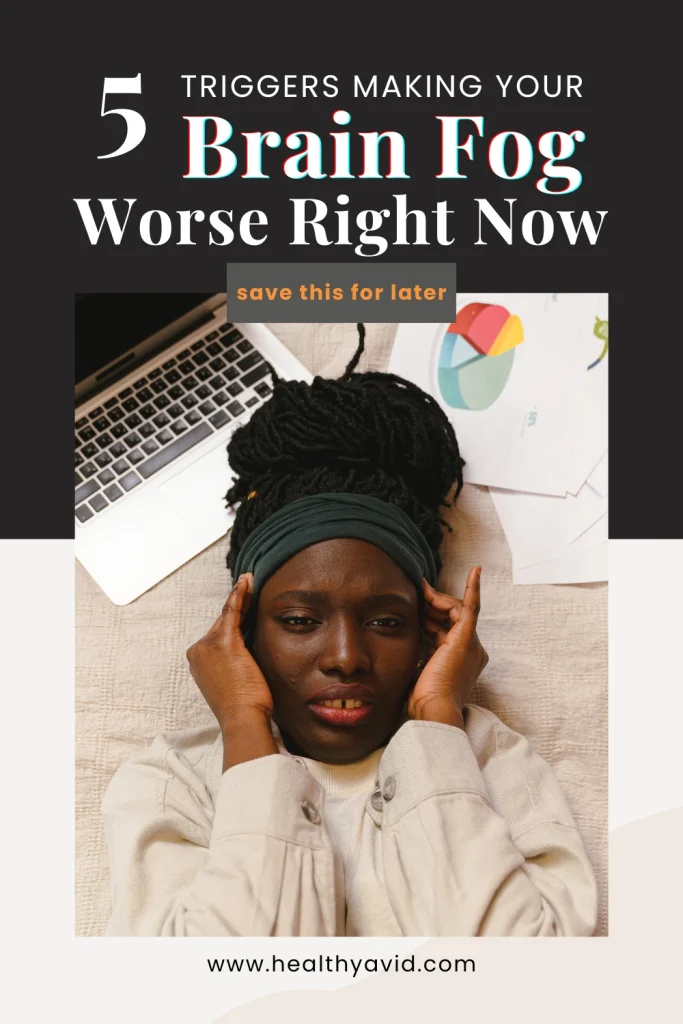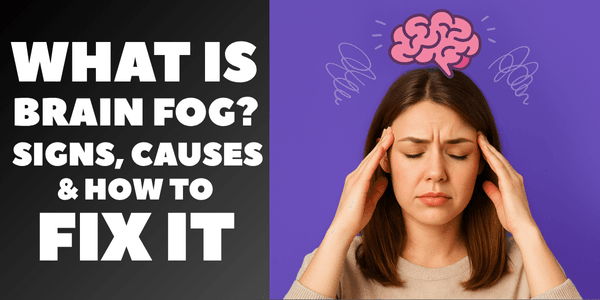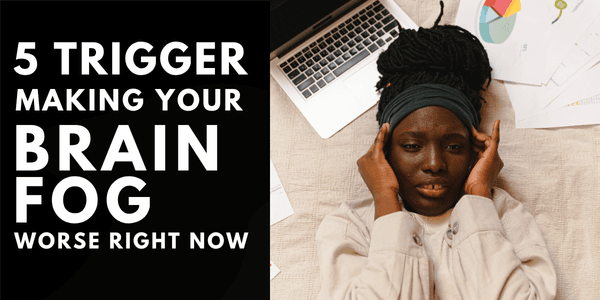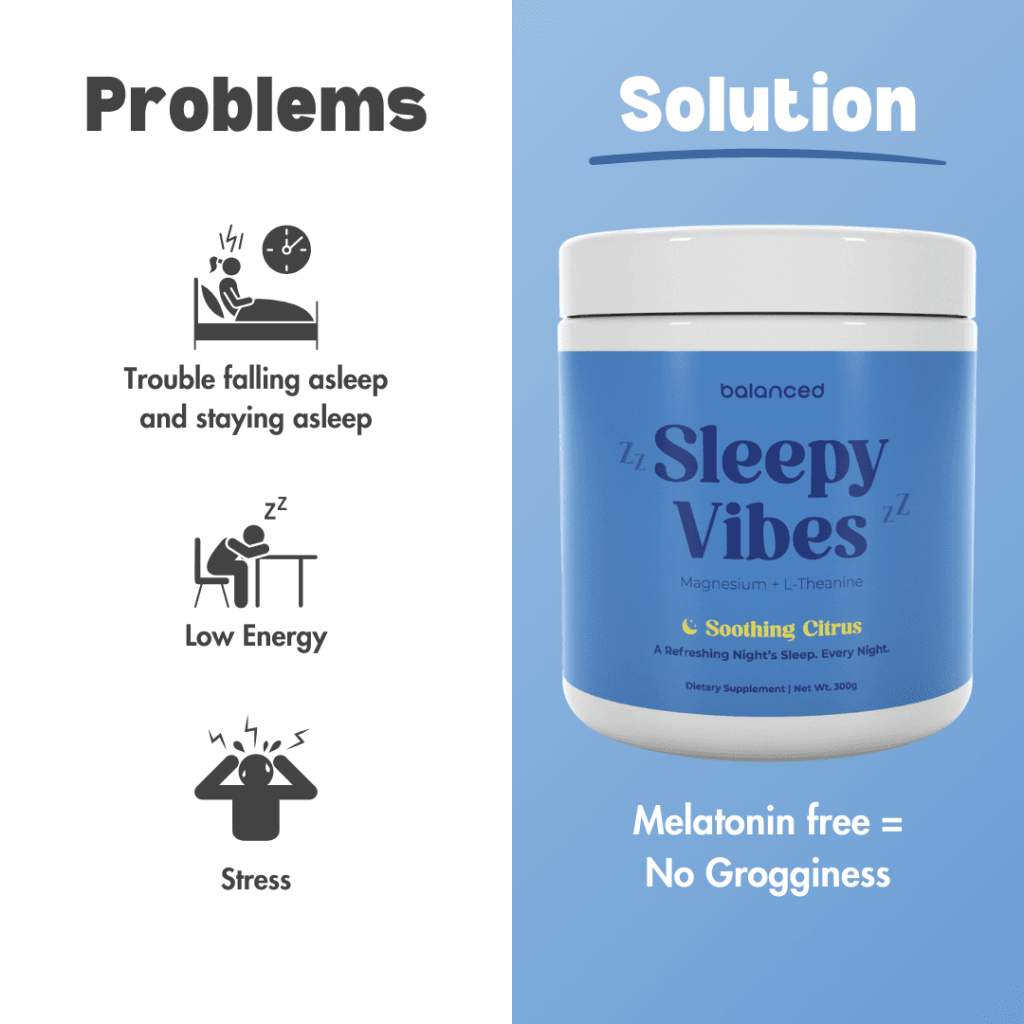Last Updated on June 19, 2025 by Lauretta Iyamu, PharmD
Have you ever walked into a room and completely forgotten why?
Do you reread emails over and over but can’t make sense of the words?
That heavy, tired, unclear feeling in your head isn’t just stress or being “off your game.” It has a name.
It’s called brain fog, and it affects millions of people every day. It’s frustrating. It’s exhausting. And for some, it makes even the simplest tasks feel overwhelming.
Brain fog is one of the most common cognitive complaints I hear about from patients, clients, and readers.
And yet, most people have no idea what’s causing it. They assume it’s just stress, maybe age, or maybe they think it’s normal to feel foggy by 2 PM.
But if you’ve been struggling with memory lapses, poor concentration, or mental fatigue, you NEED to read this article.
Because what you’re feeling is real and there’s a reason for it.
Brain fog doesn’t happen for no reason. It occurs because something in your body or brain is out of balance.
And until you fix it, you’ll keep feeling tired, unfocused, and mentally flat. But here’s the good news.
Today you will learn…
- What brain fog is (and what it’s not)
- The five most common hidden triggers behind it
- How to tell if stress, hormones, or sleep are making it worse
- What simple steps can you take to start clearing it today
Let’s get started:
What Is Brain Fog?
Brain fog is not a medical diagnosis.
But it is a very real experience.
If you’ve ever felt like your thinking was slow…
If you’ve walked into a room and forgotten why…
If you’ve stared at a screen and couldn’t remember what you were doing…
That’s brain fog.
It’s not about forgetting everything. It’s about feeling mentally off.
Like your brain is wrapped in cotton. Like you’re awake, but not fully alert.
And while it’s not inherently dangerous, it’s a warning sign.
Because brain fog doesn’t just show up out of nowhere.
It’s usually caused by something deeper going on in your body. And that “something” can be stress, poor sleep, hormone shifts, or even the food you eat.
If you don’t identify the cause, the fog stays.
But once you do, it becomes something you can fix.
5 Triggers That Can Make Your Brain Fog Worse
1. Stress
Stress is one of the most common reasons people feel foggy in the head.
When you’re stressed, your body makes a hormone called cortisol.
A little cortisol is fine. It helps you deal with pressure.
But when stress doesn’t stop, cortisol stays high.
And that’s when the problems start.
Too much cortisol can:
- Make your memory worse
- Make it hard to focus
- Leave you feeling tired all the time
Even if you sleep and eat well, stress can still affect your brain’s functioning.
- You might forget simple things.
- You might read something and not remember what it said.
- You might feel like your thoughts are moving in slow motion.
This isn’t your fault.
It’s your body’s reaction to too much pressure.
To clear the fog, you need to calm your body.
This doesn’t mean quitting your job or going on vacation.
Even brief breaks during the day, deep breathing exercises, or quiet time before bed can help lower your stress levels.
And when that happens, your thinking will start to feel clear again.

2. Sleep Deprivation
If you’re not sleeping enough, your brain can’t work the way it should.
Sleep is when your brain rests, heals, and resets.
Without it, everything starts to slow down.
This is one of the biggest causes of brain fog.
When you don’t sleep well, you may notice:
- Trouble focusing
- Forgetting simple things
- Feeling confused or off
- You need more coffee just to get through the day
Even one bad night of sleep can make you feel foggy.
But if it happens often, your brain never gets a chance to fully recover.
And no, you can’t fix it with more caffeine.
You need to get at least 7 hours of deep, regular sleep each night.
If your brain fog is worse in the morning or after a poor night’s sleep, this may be your biggest issue.
- Try going to bed at the same time every night.
- Turn off screens 30 minutes before sleep.
- Keep your bedroom dark and quiet.
- Take a melatonin-free supplement. Try this.
These small changes can help your brain function more clearly during the day.
3. Hormonal Changes
Your hormones have a big impact on how your brain works.
When they’re balanced, you feel alert, focused, and clear.
But when they’re out of balance, brain fog is often the result.
This happens more often than people realize.
Some common times when hormones shift:
- During pregnancy
- After giving birth
- Around menopause
- With thyroid problems
- With low testosterone (in men)
Hormones like estrogen, progesterone, thyroid, and testosterone all affect brain function.
If these hormones drop or change too quickly, you may notice:
- Trouble thinking clearly
- Forgetting names or words
- Low energy and slow thinking
- Feeling like your brain is “off”
If your brain fog started during a period of significant bodily changes, this may be the reason.
The good news is that hormone levels can be tested with simple blood work.
Once you know what’s out of balance, it can be treated.
And when your hormones improve, your brain typically follows suit.

4. Diet
What you eat has a direct effect on how your brain feels.
If your meals are high in sugar, contain processed foods, or lack essential nutrients, your brain can become sluggish.
This can lead to brain fog.
You may feel:
- Tired after eating
- Slow to think
- Moody or forgetful
- Hungry again soon after meals
That’s not just a bad day. That’s your brain reacting to poor fuel.
Your brain requires a balanced diet of healthy fats, protein, vitamins, and minerals to function optimally.
If it doesn’t get them, you may start to feel cloudy or unfocused.
Some of the worst foods for brain fog:
- Sugary snacks and drinks
- White bread and pasta
- Fried and fast food
- Skipping meals altogether
Try adding in more real, whole foods like:
- Leafy greens
- Eggs
- Berries
- Nuts
- Fish
Also, drink more water. Even mild dehydration can impair cognitive function, including slowing down brain activity.
If you’ve been feeling off and your meals haven’t been up to par, this might be the reason.
Changing your diet can clear your mind faster than you think.
5. Medications
Some medicines can cause brain fog as a side effect.
Even if they help with one problem, they might slow down your thinking or make you feel off.
Common medications linked to brain fog include:
- Allergy pills (antihistamines)
- Sleep aids
- Some antidepressants
- Anti-anxiety medications
- Painkillers
- Blood pressure medications
These drugs can make you feel:
- Tired during the day
- Slower to think
- Forgetful
- Mentally foggy
This doesn’t mean the medicine is bad.
But it does mean your brain might not be handling it well.
If you noticed brain fog after starting a new medication or changing your dose, this might be the reason.
Never stop a medication without talking to your doctor first.
But it’s a good idea to bring it up at your next appointment.
A small change in your dose or trying a different option could help clear your thinking

When to Talk to a Doctor About Brain Fog
Some brain fog is typical.
Everyone has off days.
But if your brain fog is happening often and it’s getting in the way of your daily life, it’s time to get help.
You should talk to a doctor if:
- The fog lasts more than a few weeks
- It’s affecting your work, memory, or focus
- You feel confused more often than usual
- You have other symptoms like weight gain, hair loss, or mood changes
These could be signs of something more profound, like:
- Vitamin deficiencies
- Thyroid problems
- Hormone imbalance
- Blood sugar issues
- Early signs of memory decline
A doctor can run simple tests to check these things.
Ask about testing for:
- Thyroid (TSH, Free T3, Free T4)
- Vitamin B12 and Vitamin D
- Iron levels
- Blood sugar and insulin
- Hormone levels
You can also help your doctor by keeping a symptom log.
Write down when the brain fog happens, how long it lasts, what you ate, how you slept, and any stress you were feeling.
This can help you identify patterns and assist your doctor in finding answers.
The Bottom Line
While it may be easy to brush off brain fog as “just being tired” or “getting older,” I would strongly caution against ignoring it.
Brain fog is not something you just have to live with.
And it’s not normal to feel mentally drained every day.
When you understand what’s causing it and take the right steps, you can clear your mind and get back to feeling like yourself.
Most of the time, the solution isn’t complicated.
It just starts with knowing where to look.
Here’s what to do next:
- Start by looking at the five main triggers
- Make one or two small changes this week
- Track your symptoms
- Talk to your doctor if things don’t improve
But now I want to hear from you:
Have you been struggling with brain fog?
Did you find any of these triggers in your daily routine?
What changes have helped you feel clearer and more focused?
Leave your questions or comments below!
FAQ
What are the main triggers for brain fog?
Stress, lack of sleep, hormone changes, poor diet, and certain medications.
Can brain fog go away on its own?
Sometimes. However, if it persists for more than a few weeks, it’s best to identify the cause and treat it directly.
How do I know if my brain fog is serious?
If it occurs frequently or significantly affects your daily life, consult a doctor. It could be a sign of something more profound.
Can changing my diet really help?
Yes. Eating less sugar and more real food can improve brain function quickly.
Should I stop my medication if I think it’s causing brain fog?
No. Always talk to your doctor first. They can help adjust the dose or switch to something else.









































